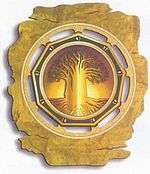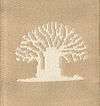Order of the Baobab
| The Order of the Baobab | |
|---|---|
 | |
| Awarded by President of South Africa | |
| Type | National Order |
| Eligibility | South African citizens |
| Awarded for | Service |
| Status | Currently constituted |
| Grades (w/ post-nominals) |
|
| Statistics | |
| First induction | 10 December 2002 |
| Distinct recipients | 100 |
 | |
| Ribbon section | |
The Order of the Baobab is a South African civilan national honour, awarded to those for service in business and the economy; science, medicine, and for technological innovation; and community service. It was instituted on 6 December 2002, and is awarded annually by the President of South Africa. The order is named after the baobab tree, which was chosen as a symbol because of its endurance and tolerance, its vitality, its importance in agro-forestry systems, and its use as a meeting place in traditional African societies.[1]
Until the Order of Luthuli and the Order of Ikhamanga were established in 2004, the Order of the Baobab also covered service in the fields now covered by those orders.
Current classes
The three classes of appointment to the Order are, in descending order of precedence:
- Supreme Counsellor of the Baobab is gold, for exceptional service (SCOB)
- Grand Counsellor of the Baobab is silver, for distinguished service (GCOB)
- Counsellor of the Baobab is bronze, for dedicated service (COB)
Symbolism
The central motif is a baobab tree, one of the oldest trees in Africa, with roots symbolising longevity. The badge is bordered by a nonagon shape, a nine-sided polygon, with each side representing one of the nine South African provinces. It represents the many different areas of possible contribution and service, in building a prosperous nation. The roughly rectangular shaped plaque, is textured to represent the baobab tree bark that is commonly used to make mats and hats. [2]
The ribbon is gold, with recurring cream-coloured baobab silhouettes down the centre. All three classes are worn around the neck. The South African coat of arms is displayed on the reverse of the badge.
Recipients
These are all the recipients, in order of most recent:[1]
| Name | Grade | Date awarded |
|---|---|---|
| Prof. Emeritus James David Lewis-Williams | SCOB | 18 December 2015 |
| Frank Dutton | SCOB | 2012 |
| Otto Stehlik | GCOB | 18 December 2015 |
| Dr. Andrew Ross | GCOB | 18 December 2015 |
| Dr. Mary Susan Makobatjatji Malahlela | GCOB | 17 December 2015 |
| Douglas John Anderson | GCOB | 17 December 2015 |
| J. Yvonne Mokgoro | COB | 17 December 2015 |
| Dr. Sayed Mohamed Ridwan Mia | GCOB | 29 May 2014 |
| Herbert William Garnet De La Hunt | GCOB | 29 April 2014 |
| Colin Wells Eglin | GCOB | 29 April 2014 |
| David Jacobus Bosch | GCOB | 29 April 2014 |
| Yusuf Abramjee | GCOB | 29 April 2014 |
| Suraya Khan | COB | 29 April 2014 |
| Nontsikelelo Qwelane | COB | 29 April 2014 |
| The Revd Phambani Jeremiah Mzimba | SCOB | 27 April 2011 |
| The Rt Revd David Patrick Russell | GCOB | 27 April 2011 |
| William Sinclair Winship | GCOB | 27 April 2011 |
| Nowongile Cynthia Molo | COB | 27 April 2011 |
| Reginald Dudley Forde | COB | 27 April 2011 |
| Imtiaz Sooliman | GCOB | 27 April 2010 |
| James Mata Dwane | SCOB | 27 April 2010 |
| Lord Joel Joffe | SCOB | 27 April 2010 |
| Malebone Susan Luthuli | GCOB | 27 April 2010 |
| Malefu Mphathane | GCOB | 27 April 2010 |
| Vincent Naidoo | GCOB | 27 April 2010 |
| The Revd Dr Barney Pityana | GCOB[3] | 2006 |
See also
References
- 1 2 "The Order of the Baobab". The Presidency South Africa. Retrieved 29 January 2016.
- ↑ "The Order of the Baobab". SA History. Retrieved 29 January 2016.
- ↑ "Barney Pityana (1945–)". The Presidency, The Republic of South Africa. Retrieved 2016-01-29.